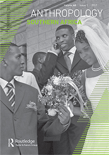
Anthropology Southern Africa
Scope & Guideline
Illuminating the complexities of cultural phenomena in Southern Africa.
Introduction
Aims and Scopes
- Multispecies Relations:
The journal examines the intricate relationships between humans and non-human entities, exploring how these interactions shape cultural and ecological landscapes in Southern Africa. - Historical Contextualization:
Papers often delve into the historical narratives that inform current social structures, identities, and ecological practices, providing a deeper understanding of contemporary issues. - Social Dynamics and Mobility:
Research highlights the mobility of individuals, communities, and ideas, particularly in the context of migration, urbanization, and social change. - Public Health and Anthropology:
The journal engages with public health issues, particularly in light of recent global health crises, analyzing how cultural practices and beliefs intersect with health policies and responses. - Indigeneity and Cultural Identity:
There is a consistent focus on indigenous perspectives, exploring themes of identity, heritage, and the political implications of cultural practices. - Political Ecology:
The journal emphasizes the political dimensions of ecological issues, examining how power dynamics influence environmental conservation and resource management.
Trending and Emerging
- Multispecies and Ecological Studies:
There is a growing interest in multispecies studies, which analyze the interconnections between humans and other species, particularly in the context of ecological conservation and environmental justice. - Impact of Covid-19 on Social Structures:
Research focusing on the sociocultural impacts of the Covid-19 pandemic has surged, examining how the pandemic has reshaped community dynamics, health practices, and cultural rituals. - Migration and Transnationalism:
Themes related to migration, particularly the experiences of undocumented migrants and the socio-political implications of mobility, have gained prominence in recent publications. - Indigenous Knowledge Systems:
There is an increased emphasis on indigenous knowledge systems and practices, highlighting the importance of local perspectives in understanding cultural heritage and ecological sustainability. - Political Economy of Health:
The intersection of political economy and health has emerged as a critical area of study, exploring how economic factors influence health outcomes and access to care in Southern Africa.
Declining or Waning
- Traditional Anthropology Methods:
There is a noticeable shift away from conventional ethnographic methodologies that do not incorporate contemporary challenges, such as digital engagement and remote research. - Focus on Urbanization without Multispecies Context:
While urban studies remain relevant, there has been a decline in papers that do not integrate multispecies perspectives, indicating a narrowing of focus on purely human-centric urban issues. - Historical Narratives without Contemporary Relevance:
Papers that explore historical narratives without connecting them to modern implications are becoming less frequent, as researchers seek more immediate relevance in their work. - Conventional Public Health Approaches:
There appears to be a decline in studies that approach public health from a purely biomedical perspective, with more emphasis on cultural and anthropological insights. - Narrowly Defined Cultural Studies:
The scope of cultural studies that do not engage with broader socio-political contexts or ecological considerations is diminishing, as interdisciplinary approaches gain traction.
Similar Journals

Annual Review of Anthropology
Exploring the Depths of Human CultureAnnual Review of Anthropology is a premier journal published by Annual Reviews, dedicated to providing comprehensive and authoritative reviews in the field of anthropology. Established with the goal of synthesizing essential research findings, this influential publication not only shapes contemporary anthropological discourse but also facilitates interdisciplinary dialogue within the broader realm of social sciences and cultural studies. With an impressive impact factor that places it in the Q1 category across multiple classifications, including Anthropology and Arts and Humanities, this journal is highly regarded by researchers and academics alike. The Annual Review of Anthropology has been a trusted resource for critical insights and transformative ideas, helping to advance the understanding of human societies from 1980 to the present. Although it does not offer open access, access to its articles is available through various academic institutions, ensuring that both seasoned scholars and students can benefit from its wealth of knowledge. With a Scopus ranking placing it in the top percentiles for relevant subjects, this journal is essential reading for anyone looking to stay at the forefront of anthropological research.
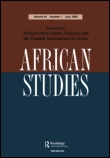
AFRICAN STUDIES
Unveiling the Rich Tapestry of African ScholarshipAFRICAN STUDIES, published by Routledge Journals, Taylor & Francis Ltd, is a leading academic journal that has been at the forefront of African research since its inception in 1942. With an impressive convergence of interdisciplinary insights covering Anthropology, Cultural Studies, History, and Political Science, this journal serves as an essential resource for scholars and practitioners alike. It boasts a notable impact within its field, ranking in the Q1 quartile for Cultural Studies and History and achieving a commendable Q2 for Anthropology, and Political Science and International Relations according to the 2023 category quartiles. Researchers can benefit from the journal's rigorous peer-review process, which ensures high-quality and impactful research dissemination. While it is not an open-access journal, it offers various subscription options for accessing its wealth of scholarly articles. With a commitment to advancing understanding of African contexts and perspectives, AFRICAN STUDIES plays a crucial role in shaping contemporary debates and fostering intellectual engagement within the academic community.

Altre Modernita-Rivista di Studi Letterari e Culturali
Democratizing Knowledge through Literary InquiryAltre Modernita-Rivista di Studi Letterari e Culturali, published by Milano University Press, serves as a significant platform in the fields of Cultural Studies, Linguistics, and Literature. Since its transition to Open Access in 2009, this journal has made strides in democratizing knowledge, ensuring that resources and research are accessible to a broader audience. With an ISSN of 2035-7680, it publishes innovative research and critical discourse aimed at fostering interdisciplinary dialogue within the humanities. Although currently positioned in Q4 and Q3 quartiles, Altre Modernita is steadily contributing to academic conversation, promoting literary analysis, cultural critique, and linguistic exploration. Located in Italy, it invites contributions from scholars worldwide, encouraging a diverse range of perspectives. Altre Modernita remains a valuable resource for researchers, professionals, and students dedicated to understanding the complexities of modern literature and cultural narratives.
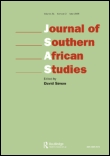
JOURNAL OF SOUTHERN AFRICAN STUDIES
Fostering Critical Discourse on Southern Africa's Contemporary IssuesThe JOURNAL OF SOUTHERN AFRICAN STUDIES, published by Routledge Journals, Taylor & Francis Ltd, is a premier scholarly outlet dedicated to the exploration and analysis of social, political, and cultural dynamics affecting the Southern African region. With an established history since 1974, this journal features articles that contribute significantly to various disciplines, including Arts and Humanities, Sociology, and Geography, and is recognized within its fields as evidenced by its Q2 and Q3 quartile rankings in the latest assessments. Offering a rich academic platform for researchers, professionals, and students, it fosters interdisciplinary approaches and welcomes critical discourse on contemporary issues, ensuring relevance and impact in today's rapidly changing socio-political landscape. Notably, the journal has achieved commendable rankings on Scopus, affirming its standing as an influential source of knowledge. Although not open access, it remains a vital resource for those seeking to deepen their understanding of Southern Africa and its global implications.
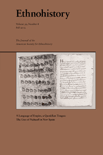
ETHNOHISTORY
Exploring the Intersections of Culture and HistoryETHNOHISTORY is a prestigious academic journal published by DUKE UNIVERSITY PRESS, focusing on the interdisciplinary study of historical and anthropological methodologies. With its ISSN 0014-1801 and E-ISSN 1527-5477, the journal has made significant contributions to understanding the complex intersections of culture, history, and social dynamics since its inception in 1970. It holds a Q3 ranking in Anthropology and a Q2 ranking in History, reflecting its relevance in contemporary scholarly discourse, and boasts impressive Scopus rankings, placing it in the 77th percentile in History and the 45th percentile in Anthropology. While it does not operate under an Open Access model, the journal remains vital for researchers seeking comprehensive scholarly insights into the ethnographic historical record. The objective of ETHNOHISTORY is to foster dialogue among historians and anthropologists, ensuring the voices of marginalized communities and overlooked narratives are preserved and acknowledged in historical analyses. Researchers, professionals, and students will find invaluable resources and rigorous scholarship that provoke thought and inspire further exploration in the fields of history and anthropology at ETHNOHISTORY.
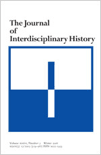
JOURNAL OF INTERDISCIPLINARY HISTORY
Exploring the Nexus of History and InnovationThe JOURNAL OF INTERDISCIPLINARY HISTORY, published by MIT PRESS, serves as a pivotal platform for scholarly discourse at the intersection of history and various interdisciplinary fields. With a rich publication history dating back to 1970, the journal has continually provided a critical forum for exploring innovative historical methodologies and themes that resonate across diverse academic domains. Although it is not an Open Access journal, it remains invaluable for researchers dedicated to advancing the understanding of historical narratives and their implications within contemporary contexts. As reflected in its impressive Scopus ranks, the journal occupies a respectable position within its quartiles, holding Q3 in History and Q4 in History and Philosophy of Science. This suggests a growing recognition of its contributions among scholars in the field. Located in Cambridge, MA, USA, the journal is accessible to a global audience, fostering collaboration and dialogue among professionals, historians, and students alike. Whether you are a seasoned researcher or a budding student, the JOURNAL OF INTERDISCIPLINARY HISTORY stands as an essential resource for navigating the complexities of historical inquiry.
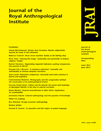
JOURNAL OF THE ROYAL ANTHROPOLOGICAL INSTITUTE
Bridging Cultures Through Scholarly ExcellenceJOURNAL OF THE ROYAL ANTHROPOLOGICAL INSTITUTE, published by Wiley, stands as a prestigious platform for scholarly discourse in the field of anthropology. With an ISSN of 1359-0987 and an E-ISSN of 1467-9655, this journal has been a vital resource for researchers, professionals, and students since its inception, featuring contributions that push the boundaries of understanding in both cultural and social anthropology. The journal’s rigorous peer-review process affirms its high academic standards, reflected in its top-tier Q1 rankings in both the Anthropology and Arts and Humanities categories for 2023. With a current ranking of #78 out of 502 in Social Sciences Anthropology and #138 out of 552 in Miscellaneous Arts and Humanities, it inhabits a critical space within academia, addressing seminal issues and innovative research. While the journal is not open access, it remains accessible to those affiliated with institutions that provide subscriptions, ensuring that groundbreaking anthropological insights are disseminated widely within the academic community. As it converges from 1995 to the present, the JOURNAL OF THE ROYAL ANTHROPOLOGICAL INSTITUTE continues to shape the landscape of anthropological research, engaging a diverse readership eager to explore the intricate tapestry of human cultures.

Antropologia Portuguesa
Unlocking the Rich Tapestry of Anthropological InsightsAntropologia Portuguesa, published by COIMBRA UNIV PRESS, is a distinguished open access journal in the field of anthropology, with an ISSN of 0870-0990 and an E-ISSN of 2182-7982. Based out of Coimbra, Portugal, this journal has been a vital resource for researchers and enthusiasts in the anthropological community since transitioning to an open access model in 2012, allowing for broader dissemination and accessibility of knowledge. With its diversified publications spanning from 2011 to 2023, it is well-established within the academic landscape, achieving a Q3 category rank in anthropology as of 2023, and holding a Scopus ranking of #376 out of 502 in the Social Sciences category, placing it within the 25th percentile. The journal aims to foster interdisciplinary dialogue and promote innovative research, offering a platform for the exploration of various anthropological themes and practices. As it continues to contribute to the scholarship in anthropology, Antropologia Portuguesa is an invaluable resource for researchers, professionals, and students committed to understanding cultural dynamics and human behavior on a global scale.
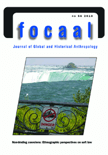
Focaal-Journal of Global and Historical Anthropology
Bridging Historical Contexts with Contemporary IssuesFocaal-Journal of Global and Historical Anthropology is an esteemed academic journal published by BERGHAHN JOURNALS, focusing on the intricacies of global and historical anthropology. With an impressive impact factor and positioned in the Q1 category of anthropology for 2023, this journal is recognized for its exceptional contributions to the field, ranking #121 out of 502 in the Social Sciences category on Scopus. Since its transition to Open Access in 2020, Focaal has made significant strides in democratizing academic knowledge, allowing broader accessibility for researchers, professionals, and students worldwide. The journal provides a platform for interdisciplinary dialogue and critical analysis, paving the way for innovative research and thought-provoking discussions. With a commitment to fostering a deeper understanding of anthropological practices and their global implications, Focaal is an essential resource for anyone engaged in contemporary anthropological studies.

Boletin Antropologico
Bridging Knowledge and Culture in AnthropologyBoletin Antropologico, published by UNIV LOS ANDES, is a vital academic journal dedicated to the field of anthropology, focusing on the diverse cultural practices, social structures, and historical contexts of societies, particularly within Latin America. With its ISSN of 0257-750X, this journal aims to provide a platform for researchers and scholars to disseminate their findings and engage in meaningful discussions that advance the understanding of anthropological issues. Although Boletin Antropologico currently does not follow an open-access model, it remains a significant resource for professionals seeking peer-reviewed content that reflects rigorous academic standards. With a commitment to fostering intellectual growth and collaboration among anthropologists, the journal serves as an essential reference for students and practitioners keen on exploring the rich tapestry of human cultures and societies.